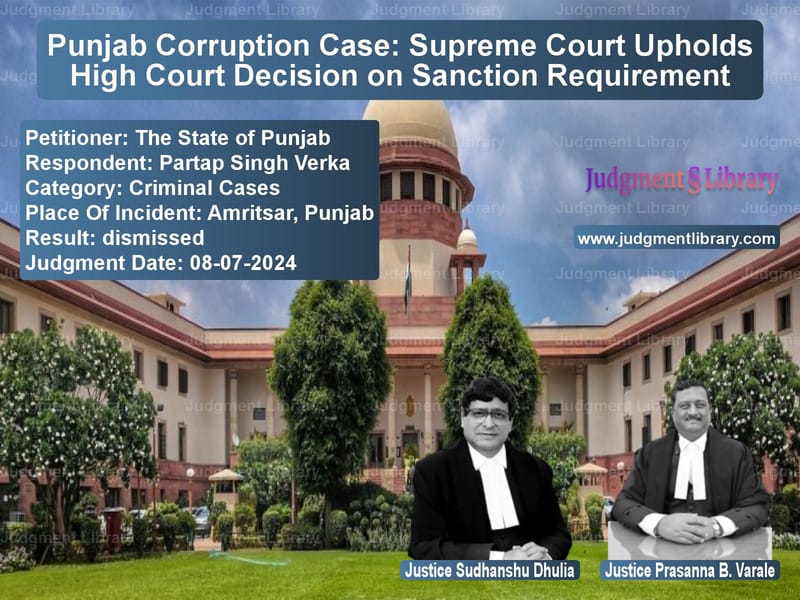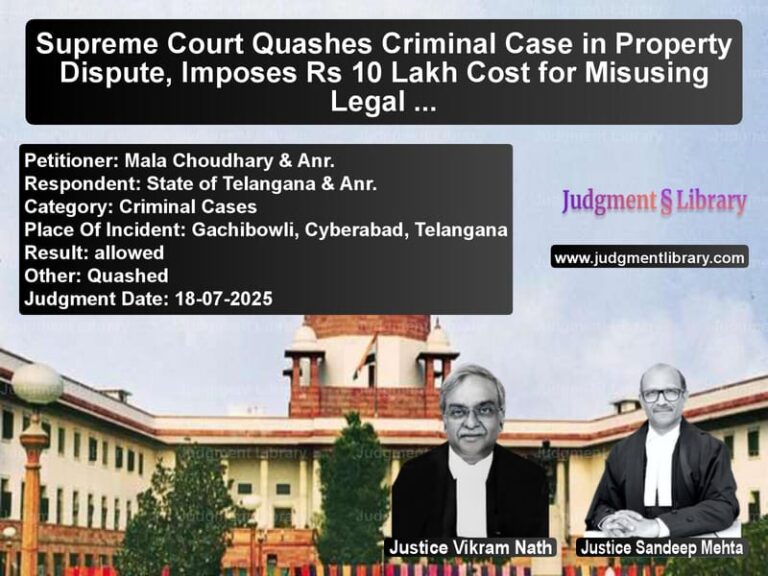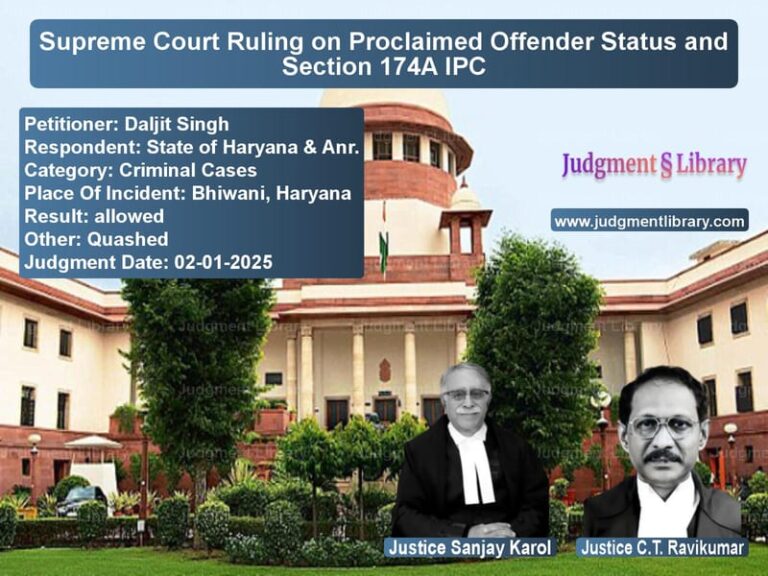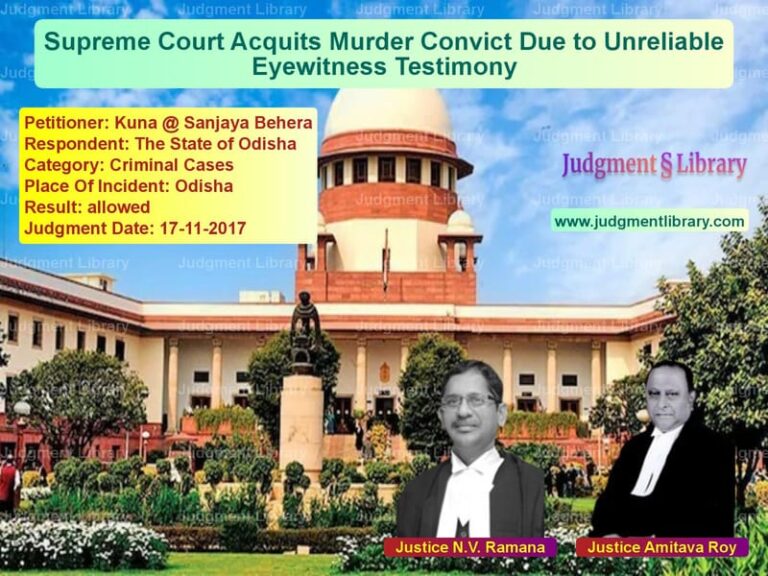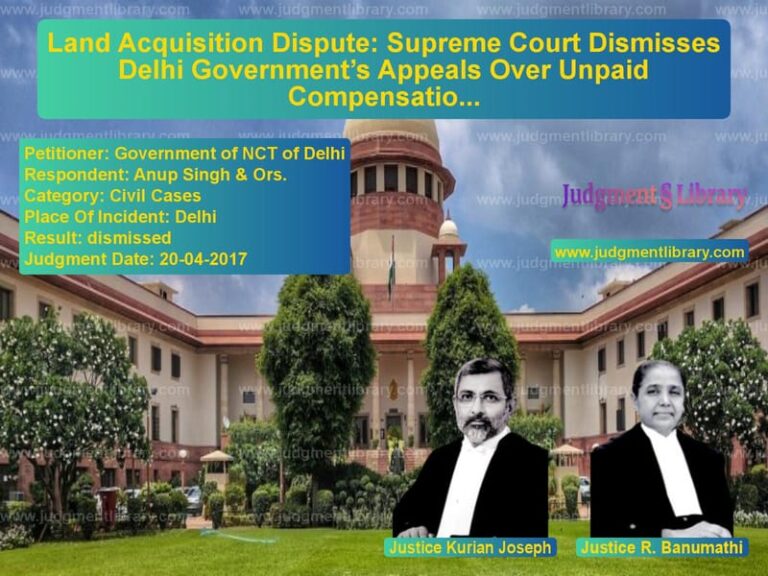Punjab Corruption Case: Supreme Court Upholds High Court Decision on Sanction Requirement
The Supreme Court of India recently delivered a significant judgment in the case of The State of Punjab vs. Partap Singh Verka, addressing the issue of sanction requirements under the Prevention of Corruption Act, 1988. The case revolved around the prosecution of a public servant accused of accepting a bribe. The apex court upheld the High Court’s decision, emphasizing that no court can take cognizance of corruption charges against a public servant without prior government sanction.
Background of the Case
The case originated from an FIR registered on April 25, 2016, under Sections 7 and 13(2) of the Prevention of Corruption Act against Dr. Partap Singh Verka, a doctor at Guru Nanak Hospital, and a ward attendant named Vikas. The complainant, Gurwinder Singh, alleged that Dr. Verka had demanded a bribe of Rs. 10,000 through Vikas for admitting the complainant’s jailed brother into the hospital. Later, the doctor allegedly demanded another Rs. 10,000 to keep the patient in the hospital.
The Vigilance Bureau laid a trap and caught Vikas red-handed while receiving Rs. 5,000 in the hospital parking lot. Dr. Verka was arrested on the same day from his office. However, when the chargesheet was filed on December 22, 2016, Dr. Verka was not named as an accused, and only Vikas was charged.
Trial Court’s Summoning Order
During the trial, on May 12, 2017, the complainant testified that Dr. Verka was the one who demanded the bribe and that Vikas collected it on his behalf. Based on this testimony, the Public Prosecutor moved an application under Section 319 of the Code of Criminal Procedure (CrPC) on May 18, 2017, seeking to summon Dr. Verka as an accused. The Trial Court allowed the application and issued summons to Dr. Verka on May 20, 2017.
High Court’s Reversal of Trial Court Order
Dr. Verka challenged the summoning order in the Punjab and Haryana High Court. The High Court ruled in his favor, setting aside the Trial Court’s order on the grounds that no prior sanction had been obtained under Section 19 of the Prevention of Corruption Act. It held that without such sanction, the court could not take cognizance of the charges against a public servant.
Supreme Court’s Ruling
The Supreme Court upheld the High Court’s decision, stating that the Trial Court erred in summoning Dr. Verka without prior sanction from the appropriate government authority. The Court made several key observations:
- Mandatory Requirement of Sanction: The Court reiterated that under Section 19 of the Prevention of Corruption Act, no court can take cognizance of offenses under Sections 7, 11, 13, and 15 without prior sanction from the government.
- Overriding Effect of Section 19: The Court clarified that the requirement for sanction under the Prevention of Corruption Act takes precedence over the general provisions of the CrPC, including Section 319.
- Flawed Procedure by Trial Court: The Supreme Court criticized the Trial Court for failing to insist on prior sanction before summoning Dr. Verka.
Quoting its previous rulings, the Court stated:
“This section creates a complete bar on the power of the court to take cognizance of an offense punishable under Sections 7, 10, 11, 13, and 15 unless prior sanction is obtained from the competent authority.”
Legal Precedents Cited
The Supreme Court relied on several precedents to support its ruling:
- Dilawar Singh v. Parvinder Singh [(2005) 12 SCC 709]: This judgment established that sanction must be obtained before prosecuting a public servant under the Prevention of Corruption Act.
- Paul Varghese v. State of Kerala [(2007) 14 SCC 783]: The Court reiterated that sanction under Section 19 cannot be bypassed by invoking Section 319 of the CrPC.
- Surinderjit Singh Mand v. State of Punjab [(2016) 8 SCC 722]: The judgment emphasized that a court “shall not” take cognizance without prior sanction from the competent authority.
Conclusion
The Supreme Court’s decision in this case reinforces the importance of procedural safeguards in corruption cases involving public servants. The ruling ensures that no public servant is prosecuted without proper government approval, preventing misuse of legal provisions while maintaining accountability in corruption cases.
Read also: https://judgmentlibrary.com/supreme-court-acquits-man-due-to-procedural-lapses-in-murder-conviction/
Petitioner Name: The State of Punjab.Respondent Name: Partap Singh Verka.Judgment By: Justice Sudhanshu Dhulia, Justice Prasanna B. Varale.Place Of Incident: Amritsar, Punjab.Judgment Date: 08-07-2024.
Don’t miss out on the full details! Download the complete judgment in PDF format below and gain valuable insights instantly!
Download Judgment: the-state-of-punjab-vs-partap-singh-verka-supreme-court-of-india-judgment-dated-08-07-2024.pdf
Directly Download Judgment: Directly download this Judgment
See all petitions in Bail and Anticipatory Bail
See all petitions in Fraud and Forgery
See all petitions in Money Laundering Cases
See all petitions in Judgment by Sudhanshu Dhulia
See all petitions in Judgment by Prasanna Bhalachandra Varale
See all petitions in dismissed
See all petitions in supreme court of India judgments July 2024
See all petitions in 2024 judgments
See all posts in Criminal Cases Category
See all allowed petitions in Criminal Cases Category
See all Dismissed petitions in Criminal Cases Category
See all partially allowed petitions in Criminal Cases Category

